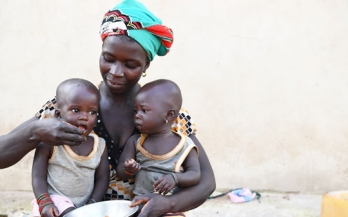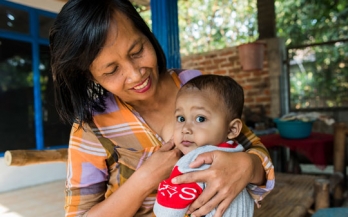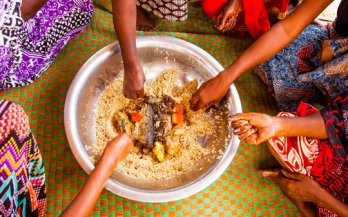Over half of the world’s population live in cities. By 2050, it is expected that almost 7 out of 10 people will reside in cities, with 90% of this growth occurring in Africa and Asia. Urbanisation is linked to increasing rates of overweight and obesity, yet undernutrition is also prevalent in cities. These areas are confronted by an increasingly complex challenge to address malnutrition in all its forms.
The framework comprises a set of drivers, plus four determinants (food supply chains, external food environments, personal food environments, and behaviours of caregivers, children and adolescents), which together influence the diets of children and adolescents.
This paper describes an innovative behaviour change communication project, implemented as part of the Baduta project, including rationale and early impacts. Baduta was a multi-component project developed by the Global Alliance for Improved Nutrition (GAIN), together with partners, to improve maternal and infant nutrition.
The FACT provides details on how to plan, design, implement, analyse, and report a FACT survey. It was designed to help stakeholders collect, analyse, and synthesise standardised data on quality, coverage, and consumption of fortified foods, and fills a gap in the availability of standardised tools to generate information to understand how well programmes are working and how to improve them.
On 3 and 4 July 2019, The Global Alliance for Improved Nutrition (GAIN) and The Consumer Goods Forum (CGF) organised a meeting in Geneva to discuss the why, what and how of improving employee nutrition. The meeting was attended by a broad range of stakeholders who are actively involved in Workforce Nutrition programmes. This paper reports on the discussions and outcomes of the workshop.
The Global Alliance for Improved Nutrition (GAIN) and the World Health Organization (WHO) organised a consultation in Geneva in June 2018, which brought together more than 80 researchers, practitioners, policymakers and youth organisations, as well as adolescents from Pakistan, Bangladesh, Indonesia and Zambia. This paper reports on the discussions and outcomes of the workshop.
Food systems are essential to delivering healthy, affordable and sustainable diets, but the nutritional needs of children and adolescents are often not prioritised. UNICEF and GAIN co-hosted a global consultation on children, adolescents and food systems in November 2018.
The FACT consists of a manual and 10 practical tools and templates that provides standardised methods for the collection, analysis, and synthesis of data on quality, coverage, and consumption of fortified foods across countries while allowing for adaptations to meet specific country needs and contexts.
GAIN through its experts have performed an economic impact analysis of Malnutrition in Pakistan. This analysis represents the potential economic impact of an intervention. For this purpose, "coefficients of loss," developed by international experts, evidence-based estimates of health risks and functional deficits associated with iron and folic acid deficiency have been used.
The goal of this study was to develop and test two methods of quantitative dietary assessment that are less technically challenging and less expensive to implement than the standard 24HR dietary recall procedure, but still capable of identifying nutrient gaps with acceptable precision.










